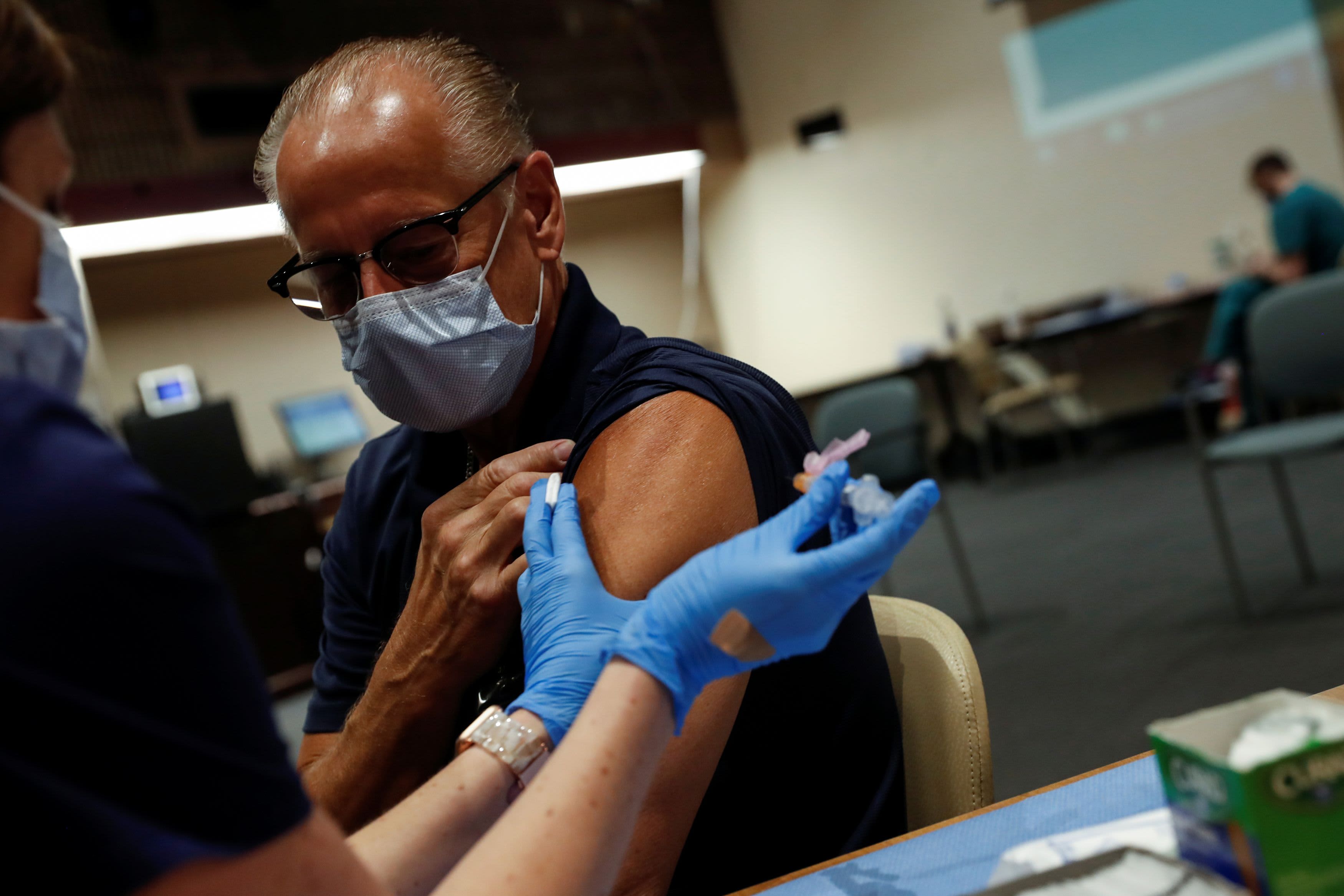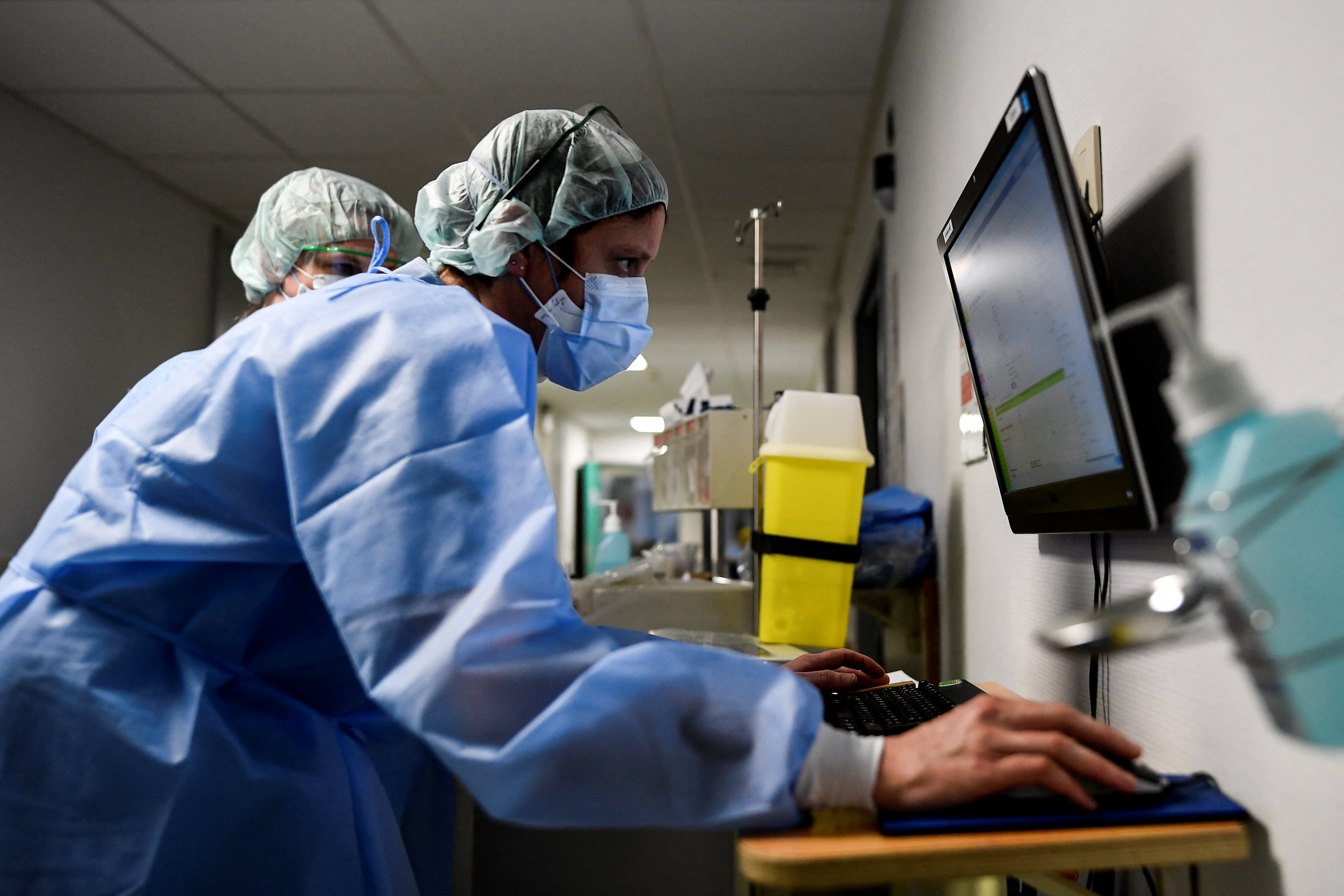As the new omicron coronavirus variant continues to spread worldwide, Chicago’s top doctor explained why the latest threat has prompted a concerned reaction from health officials over the past several days.
“[The omicron variant is] outcompeting the delta variant, outcompeting the beta variant and very quickly,” Chicago Department of Public Health Commissioner Dr. Allison Arwady said Tuesday. “So, it is probably more infectious, more contagious than delta.”
Arwady noted that within just 12 days, 90% of COVID-19 cases in South Africa have been detected as the omicron variant. Whereas both the delta and beta variants took about 100 days to saturate 80-90% of the the country.
COVID vaccines should provide “some level of protection” from omicron, according to Arwady, but booster shots would add additional support.
“I don’t want people to think ‘oh my god, vaccines aren’t working now.’ That’s not what we’re saying here,” Arwady added. “But we’re saying that with this potential new variant, we could be seeing some more breakthroughs and we could be seeing some more people getting COVID again, even if, you know, even if they had COVID in the past.”
Where have cases of the omicron COVID variant been detected? Use this map to track.
Arwady’s comments come one day after she and Chicago Mayor Lori Lightfoot first addressed concerns about the new variant.
In a joint statement Monday, the pair said the city is “very engaged in the heightened discussions regarding the omicron variant of the COVID-19 virus, particularly with our federal partners.”
“At this point, there are many questions which scientists across the world, and at the Chicago Department of Public Health, are actively working to address all while closely monitoring this strain,” the statement read. “While that work continues, we must as a city, and importantly as individuals, continue to follow the public health guidance: get vaccinated, and if vaccinated, get your booster; wear a mask indoors and when you’re around other people; and if you are feeling sick, stay home to save lives. The unvaccinated remain the most at risk to themselves and others so please get vaccinated as soon as possible.”
Similarly, Cook County’s health department said on Friday it was watching the variant “very carefully.”
“We don’t know if the variant has reached the United States, but given the global concern about the virus, it is more important than ever to continue to follow public health recommendations: Mask Up, Wash Your Hands, Stay Physically Distant, and most importantly, get vaccinated and get your booster as soon as you are eligible,” said Dr. Rachel Rubin, co-lead and senior medical officer for the Cook County Department of Public Health. “The longer people do not get vaccinated, the risk of deadlier variants increases.”
The global risk of omicron is “very high,” the World Health Organization said Monday, as more countries reported cases of the variant that has led to worldwide concern that there is more pandemic suffering ahead.
Despite the global alarm, there is still little understanding about the variant and how virulent it may be.
The World Health Organization announced last week that omircon has been classified as a “variant of concern.”
WHO Health Emergencies Programme COVID-19 Technical Lead Dr. Maria Van Kerkhove said early evidence on omicron, known by the technical term B.1.1.529, shows that the variant has a large number of mutations, some of which have concerning characteristics.
Omicron has also shown to have an increased risk of reinfection compared to other highly transmissible variants, indicating that people who contracted COVID and recovered could be more subject to catching it again with this variant.
The leading infectious disease expert for the U.S., Dr. Anthony Fauci, added that public health experts are trying to find answers to questions such as whether the omicron variant causes more severe illness and whether it can evade protection from vaccines or treatments.
“It also has a bunch of mutations that would suggest it could evade the protection, for example, of monoclonal antibodies and perhaps even convalescent plasma for people who have been infected and recovered, and possibly vaccine. These are all maybes, but the suggestion is enough,” Fauci said.
Symptoms connected to the new variant have been described as “extremely mild” by the doctor who first raised concerns over the new strain. Dr. Angelique Coetzee, chair of the South African Medical Association, told the BBC Sunday that she started to see patients earlier this month presenting with “unusual symptoms” that differed slightly from those associated with the delta variant, which is the most virulent strain of the virus to date and globally dominant.
“It actually started with a male patient who’s around the age of 33 … and he said to me that he’s just [been] extremely tired for the past few days and he’s got these body aches and pains with a bit of a headache,” she told the BBC.
The patient didn’t have a sore throat, she said, but more of a “scratchy throat” but no cough or loss of taste or smell — symptoms that have been associated with previous strains of the coronavirus.
Coetzee said she tested the male patient for COVID, and he was positive, as was his family, and then said she saw more patients that day presenting with the same kinds of symptoms that differed from the delta variant.
Other patients she had seen so far with the omicron variant had also experienced what she described as “extremely mild” symptoms, and she added that her colleagues had noted similar cases.
“What we are seeing clinically in South Africa — and remember I’m at the epicenter of this where I’m practicing — is extremely mild, for us [these are] mild cases. We haven’t admitted anyone, I’ve spoken to other colleagues of mine and they give the same picture.”
The extent of the actual spread of the omicron variant around the world, however, still remains unclear as countries discover new cases each day. Scientists in several places — from Hong Kong to Europe to North America — have confirmed its presence.
Canada’s health minister says the country’s first two cases of omicron were found in Ontario after two individuals who had recently traveled from Nigeria tested positive.
The U.S. has yet to identify any cases but Fauci and other experts have warned that it could already have made it to America.
“I would not be surprised if it is. We have not detected it yet, but when you have a virus that is showing this degree of transmissibility and you’re already having travel-related cases that they’ve noted in Israel and Belgium and other places, when you have a virus like this, it almost invariably is ultimately going to go essentially all over,” Fauci said.
Get the latest news on COVID-19 in your inbox. Click here to sign up for our daily coronavirus newsletter.
Effective Monday, the U.S. has restricted travel from South Africa and seven neighboring countries: Botswana, Zimbabwe, Namibia, Lesotho, Eswatini, Mozambique and Malawi.
Many countries are introducing such bans, though they go against the advice of the WHO, which has warned against any overreaction before the variant is thoroughly studied.
from NBC Chicago https://ift.tt/3E8ZveQ



No comments:
Post a Comment